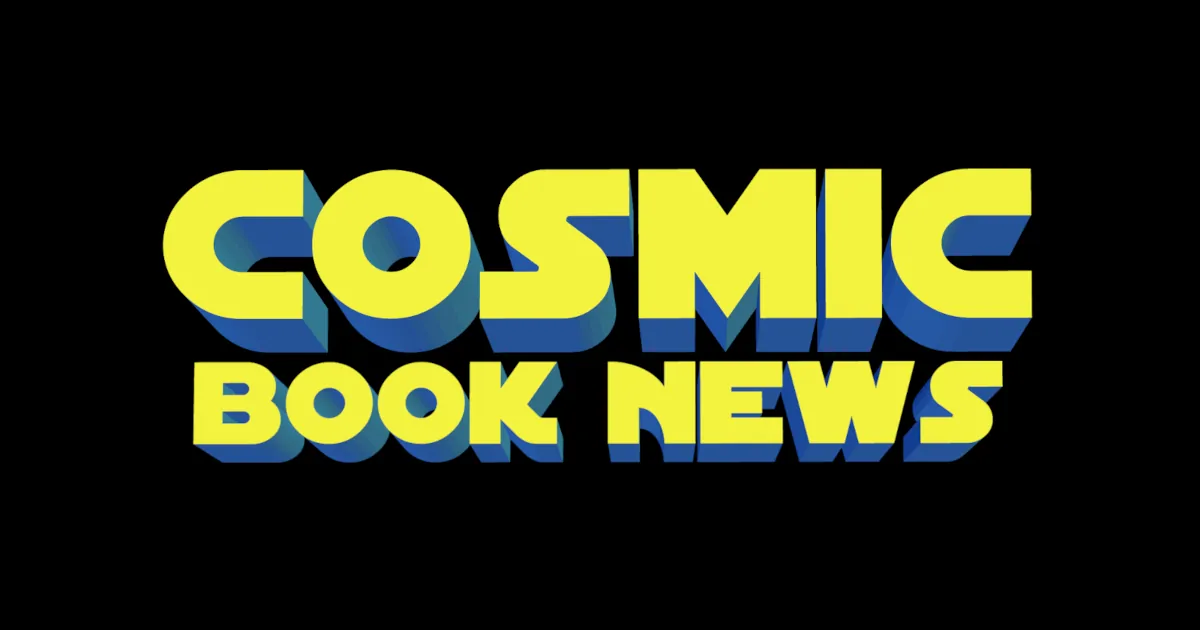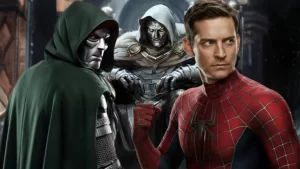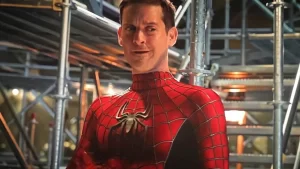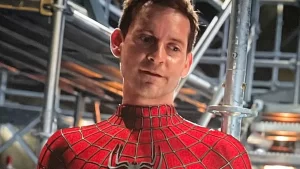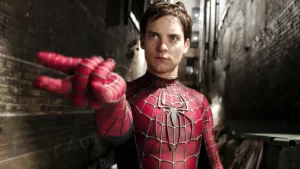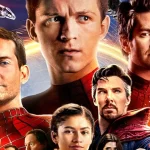Neither Good, nor Great, but OK
A Film Review of The Great Gatsby
By: Lawrence Napoli
One of the “Great American Novels” gets yet another adaptation for the silver screen thanks mostly to the efforts of director Baz Buhrmann in his 2013 vision of The Great Gatsby. Seeing the teaser trailers for this project back in 2012 certainly had me brewing with anticipation because it looked big, bold and was riddled with star power. After having seen the final cut, I am once again reminded of the trailer’s ability to make any film look 100% better than what it actually may be. This film is yet another shameless Hollywood adaptation/reboot due to zero motivation to deliver something original, but makes sense revisiting at this point in American history thanks to the story’s commentary in regards to class, greed, decadence and the human behavior that results from all of the above. Unfortunately, this film doesn’t quite deliver the same kind of impact from the original novel nor does it deliver the intimacy that defined the 1974 version starring Robert Redford. 2013’s Gatsby had a lot of things going for it, but there were too many things getting in the way of simply telling a good story that ultimately let this film down.
Things look pretty good from my self-made ivory tower.
The first hindrance for this film was the choice to have the story narrated via a strict regimen of flashbacks by an embittered Nick Carroway. The world of Gatsby’s decadence is a world that begs to be immersed within, but the film forces the audience’s perspective away from that time period to the present date in the 1930s. Apparently it was necessary to remind the audience that Nick’s retelling of Gatsby’s story was therapeutic. This happens far too often during the film which challenges the viewer to invest emotionally in one era or the other.
This criticism alone would not be so problematic had it not been accompanied by an even greater distracting element to the story: the incessant voice-overs by Nick Carroway that frequently interrupt and abbreviate dialogue scenes and dramatic moments. Oh yes readers, the voice of Tobey Maguire as Nick Carroway is a constant presence and although this story is meant to be told from his perspective, his character is perhaps the least important. Nick is the everyman who is put into privileged situations who merely observes the wealthy and powerful at play. The fact that his image and voice are featured in virtually every scene prevents any other character to take on a life of their own. The narration is so overbearing that it feels like every plot point is cherry picked for the audience, leaving nothing to independent interpretation.
[[wysiwyg_imageupload:7989:]]
Don’t mind me. It doesn’t really matter that I’m here.
The third jarring element to this film that I didn’t find nearly as egregious as the previous two was the use of anachronous music selections to fill the background noise of Gatsby’s world with a little more flavor. I could understand if the choice for using contemporary pop tracks was made to subliminally connect the kinds of things that happened during the 1920s to today, but all I have to do for that is to turn on the news, go to school, go to work or basically wake up in the morning to see rich people taking advantage of poor people. It has happened at just about every era of humanity in history, but let’s not split hairs here. The fact that Jay-Z was the executive producer for this film has everything to do with his and Beyonce’s songs (amongst others) being used throughout. This choice was made less for artistic integrity and more for increasing appeal to the masses because period pieces are not the kind of blockbusters American audiences are interested in turning out in droves for. Using music that was out-of-time in fictions such as BioShock Infinite or Luhrmann’s own Moulin Rouge worked much better because the nature of those stories were more psychological and fantastic. This Great Gatsby is a film that barely attempts to approach that level of surrealism.
[[wysiwyg_imageupload:7990:]]
99 problems and a self-absorbed producer is one.
As the director and one of the screenwriters for this film, Baz Buhrmann bears the responsibility for these criticisms. For someone who has made a career of blowing up conventional filmmaking, I find it surprising he would choose to interpret The Great Gatsby in a manner that forcibly connects all the dots for the audience. I felt that his visual aesthetics were mostly on mark in terms of framing, camera movement and the use of special effects. I felt that his best work is experienced during montage sequences that revolve around the consumption of massive amounts of alcohol. Unfortunately, it appears as though his strength does not lie in conveying what most would refer to as “the standard drama.”
[[wysiwyg_imageupload:7991:]]
Drunken fun.
The visual style of The Great Gatsby features lots of cool, period costumes and settings, but these are combined with certain visual effects that allows the audience to get a much wider view of the tri-state area during the Roaring 20’s. There are several moments that feature aerial views from miles away that zoom up to or away from the key action or dialogue that is being featured in the scene. This is a particularly neat effect that my lovely girlfriend observed as a reflection of Gatsby as a character: always wanting to be right there with the important activity, but always feeling like an outsider (a.k.a. so close, yet so far). This leads to the audience’s exposure to a healthy amount of close-ups and wide-shots which doesn’t necessarily hurt the story, but it takes some getting used to.
I didn’t care very much for any of the performances in this rendition of The Great Gatsby. Carey Mulligan as Daisy Buchanan gives the audience a healthy dose of lustful gazes and teasing smiles, but I would have preferred her to share these moments with some of her co-stars so as to develop some onscreen chemistry, of which there is none. I suppose she cannot be blamed entirely as the script does limit her opportunities, but she could certainly control the projection of her own character. I found it interesting how she went for more sympathy by portraying Daisy as a victim of circumstance rather than a willing perpetrator of decadent living. Her rendition of Daisy is not nearly as dainty and superfluous as is depicted in the novel, but doing so works against the sentiment of vilifying the super rich for what they do to Gatsby as stated by several of Nick’s narrations. Mulligan’s performance felt too neutral for me.
[[wysiwyg_imageupload:7992:]]
More of this, please.
Tobey Maguire’s Nick Carroway is supposed to be the audience’s gateway into this cinematic world, but when his character isn’t busy telling the audience what to think; his “in world” character only emits a gradient of bewilderment as his constant emotional state for most of the film. I understand that his character (as most normal people) would be perplexed by the super rich lifestyle and the kinds of behavior that is considered “acceptable” amongst their ranks. Tobey gives the audience too much of the deer in the headlights look, but it is his failure to shift status to a more assertive character via improved demeanor and line delivery that fails to sell his character as truly having enough of the decadent BS. Maguire’s wounded puppy routine works fine up to the point where he starts sounding off in disgust during the film’s third act. His character simply has no presence in any scene and perhaps this was a conscious choice between the director and actor, but it also does little to generate an emotional connection with an audience meant to appreciate his perspective above all others for this story.
[[wysiwyg_imageupload:7995:]]
I’m the true main character (if you didn’t realize by now).
Leonardo DiCaprio’s Gatsby is a character that is seldom depicted as a leader of men with a clear sense of purpose and a demonstrative presence. His character’s introduction is veiled in this kind of false confidence only to be revealed as being manically uncertain, naive, and uneasy. I can appreciate DiCaprio’s choice to portray this character in this manner due to the truth of his origin, but these moments out-number and out-class the scenes where Gatsby is meant to generate sympathy via the charismatic honesty he is meant to share with Nick and Daisy. These genuine moments simply pale in comparison to moments when it seems he’s about to have an aneurism when he fails to impress Daisy or sweats bullets when he’s clearly not in control of a situation. The unconfident Gatsby comes off as too over-the-top while the sincere Gatsby struggles to dig out from underneath Carroway’s narration and limited screen time.
[[wysiwyg_imageupload:7993:]]
I may have hemorrhoids.
My favorite performance was that of Joel Edgerton as Tom Buchanan whose role as the de facto antagonist doesn’t exactly have the same internal conflicts as any other character, but the straight-forward manner in which he plays it is refreshing amidst an ocean of generally weak characters. Tom represents “old money” in every respect which reflects the pinnacle of self assurance (whether it’s justified or not). He’s actually charismatic when he’s not being a bigoted misogynist who best represents the concept of “men as pigs.” Yet, the fact that his performance never succumbs to rage or looses full control suggests that he genuinely believes in his position, regardless of how far from reality it may actually be. I can respect that kind of confidence in a character (even in a villain) and the escalation of Tom’s bourgeois methodology gives the audience some consistency they can count on.
[[wysiwyg_imageupload:7994:]]
Where the elite meet to eat.
The Great Gatsby isn’t a terrible film because it still showcases some serious production value as well as some interesting social commentary for anyone attuned to context. Unfortunately, this is not a film I would recommend people to catch in theatres ASAP. Film, as an art form, is meant to communicate through showing and not telling. 2013’s Gatsby is a film that can’t stop telling you everything and it gets very annoying, very quickly. The audience needs to see full conversations between characters, not the Cliff’s Notes version. The audience wants characters to prove what they are on screen through action, not exposition. I’m not even sure if the spoon-fed drama is worse than the immense spectacle the trailers seemed to guarantee, yet the final film didn’t exactly deliver. The hype and expectations for The Great Gatsby were certainly through the roof, but it simply falls way short. Hopefully, the rest of the summer will prove to be more prosperous.

